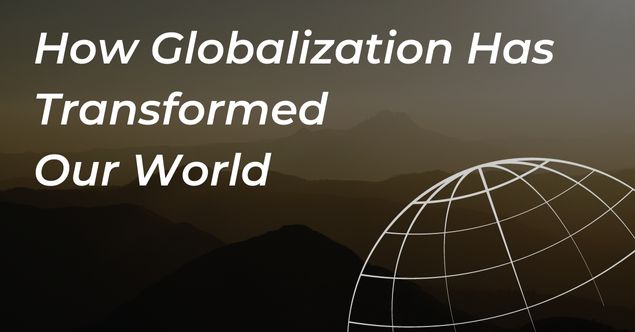Globalisation or globalisation is driven by the convergence of cultural and economic systems worldwide. The globalisation of market convergence promotes and in some cases essential increased interaction, integration and interdependence among nations. The more countries and regions of the world become politically, culturally and economically, the more globalised the world becomes.
Globalisation is the process by which ideas, knowledge, information, goods and services spread worldwide.
In business, the term is used in an economic context to describe integrated economies marked by free trade, the free flow of capital among different countries and easy access to foreign resources, including labour markets, to maximize returns and advantages for the common good.
What is Globalization?
Globalization means the speedup of movements and exchanges (of human beings, products, services, capital, technologies or cultural practices) all over the world. One of the effects of globalization is that it promotes and increases interactions between different countries and populations around the globe.
Examples of globalization in history
In 130 B.C.The Silk Road was a trade route between China and the Mediterranean Sea area. It led to the exchange of not only goods but also culture and knowledge. As merchants grew to understand Chinese culture through their trades, an appreciation for Chinese culture began to flourish well beyond China's borders. This is the best example of globalization in history.
How did globalization start?
Globalization or globalisation is the process of interaction and integration among people, businesses, and governments worldwide. The term globalization first appeared in the early 20th century and came into popular use in the 1990s to describe the unprecedented international connectivity of the post-Cold War world.
Its origins can be traced back to the 18th and 19th centuries due to advances in transportation and communications technology. This increase in global interactions has caused a growth in international trade and the exchange of ideas, beliefs, and cultures across the world.
Globalisation is primarily an economic process of interaction and integration that is associated with the social and cultural aspects of the nation. However, disputes and international diplomacy are also large parts of the history of globalization, and of modern globalization.
What is the globalization of the market?
Globalization is the ability to produce or sell products and services in global markets in open competition with the world market. There exists comprehensive foreign competition with respect to almost every product across the world.
The globalization of markets has massively increased international competition. While pursuing the strategy of globalization, the business has to face the challenges of managing human, technological, and physical resources in world markets.
Market globalisation is a synergistic term combining the promotion and selling of products and services in an increasingly interdependent and integrated global economy. It makes businesses stateless, without walls, with the internet an integral marketing and cultural tool. Understanding consumer needs within target nations helps formerly ethnocentric companies build a global marketing mix in which product, price, place and promotion are geared toward a specific country's needs.
Examples of Globalization
1) Economic globalization:
Economic globalization is the development of trade systems operating across national boundaries such as corporations or NGOs. Examples of economic globalization are Free trade agreements, such as the North American Free Trade Agreement and the Trans-Pacific Partnership.
2) Financial globalization:
It can be linked with the rise of a global financial system with international financial exchanges and monetary exchanges such as Stock markets, for example, the financially connected global world.
3) Cultural globalization:
Refers to the interpenetration of cultures which, as a consequence, means nations adopt principles, beliefs, and costumes from other nations, losing their unique culture to a unique, globalized supra-culture; cultural globalization example is the trading of commodities such as coffee or avocados.
4) Political globalization:
The development and the growing influence of international organizations such as the UN or WHO means governmental action takes place at a global level. The creation and existence of the United Nations have been called one of the basic political globalization examples.
Importance of globalisation
Globalization changes the way nations, businesses and people interact with each other. Specifically, it changes the nature of economic activity among nations, expanding trade, opening global supply chains and offering access to natural resources and labour markets.
Globalisation is also changing the way trade and financial exchange and interaction occur among nations and also promoting the cultural exchange of ideas. It removes the barriers set by geographic limitations, political boundaries and political economies.
The era of globalization creates opportunities for nations on an international level. In addition, people coming from other nations to do business and work bring with them their own cultures, which influence and mix with other cultures.
Causes of Globalisation
Improved transport making international travel easier. For example, there has been rapid growth in air travel, and shipping enabling greater movement of people and goods on an international level.
Containerisation from 1970, there was a quick adoption of the steel transport container. This reduced the price of intermodal transport, making trade cheaper and more efficient.
Improved technology makes it easier to communicate and share information across the world.
Growth of International companies with a global presence in many different economies.
Growth of global trading boost which has reduced national barriers. It reduced tariff barriers which encourage world trade. Often this has occurred through the support of the WTO.
Firms exploiting gains from economies of scale to gain expanded specialisation. This is an important feature of the new trade theory.
The growth of global media means countries are increasingly interconnected. (e.g. recession in one country affects global trade and invariably causes an economic downturn in major trading partners across the nation.)
Improved mobility of capital in the past few decades, there has been a general reduction in capital barriers, making it easier for capital to flow between different nations. This has increased the ability for companies to receive finance. It has also boosted the global interconnectedness of global financial markets.
Impact of Globalization on the Indian Economy
Investments and new jobs, local companies supplying raw materials, etc. to these industries have prospered
Indian companies gained success through collaborations with foreign companies. With Big Indian MNCs contributing to world trade, India can raise its voice for fairer trade rules at (WTO)World trade organisation.
Globalisation has created new opportunities for Indian companies, mainly businesses for IT companies.
Exports got increased therefore making trade more favourable.
Consumers have the option to choose from a wide range of products- they can have the cheapest, best thing.
Myths about globalization
Globalization leads to a reduction in inequality within the nation.
People with poor skills will not get jobs due to globalization. Companies will hire people from different countries with good skills.
Immigration laws change often, and in some countries, it will become difficult to secure visas for employees that are foreign nationals.
Loss of cultural identity begins to lose their distinctive features and will lose global diversity.
Lower costs do benefit many employees, but it also creates tough competition that leads some companies to search for cheap labour sources in other countries.
Loss of cultural identity begin to lose their distinctive features and will lose global diversity
Globalisation influences our cultural identity. Technology allows us to eliminate communication boundaries and interact with each other on a global scale. It is speeding up social and cultural processes such that human activities no longer constrain time and space.
The future of globalization
Globalization will connect more consumers to get access to high-quality, trustworthy, innovative products that they could not have had otherwise. Businesses may operate globally, but they’ll need to adapt to regional sources.
The digital economy will change the way goods and services will get developed and delivered in industries. Every business sector will benefit from tourism to higher education to healthcare.
People can work more remotely, they can travel anywhere while they do their jobs, which will have a long-term effect of globalizing the travel industry which can bring more business to different nations.
Globalisation Today
The trend has reversed again in the 21st century, an era of unusual global integration. Changes in technology and international economic policies have reduced many barriers to the free flow of production, services, and capital.
Transport and communications costs have dropped at the same time, and there have also been reductions in tariffs and other barriers to international trade that have opened up the global economy.
The globalisation of the global economy has led to overall growth in international economic activity consequently, the importance of international trade in the world economy has also greatly increased.
In addition to more market-friendly policies and an acceleration of economic growth, a second significant evolution in the forces of globalisation occurred as a result of a range of countries, primarily Asian economies becoming more important economic forces in the international economy.
Summary
Globalisation is a term used to describe how trade and technology have made the world a more connected and interdependent place. Globalisation also captures in its scope the economic and social changes that have come between nations.
Globalization is the spread of the flow of financial products, goods, technology, information, and jobs across countries and cultures. In economic terms, it describes an interdependence of nations around the nation fostered through free trade.
FAQ's on Globalization:
Globalization theories emphasize cultural and economic factors as the main determinants which impact the social and political conditions of nations, which is similar to the "comprehensive social school" of Max Weber's theories (13).
In general, globalization decreases the cost of manufacturing. This means that companies can offer goods at a lower price to consumers.
Many scholars say it started with Columbus's voyage to the New World in 1492.





